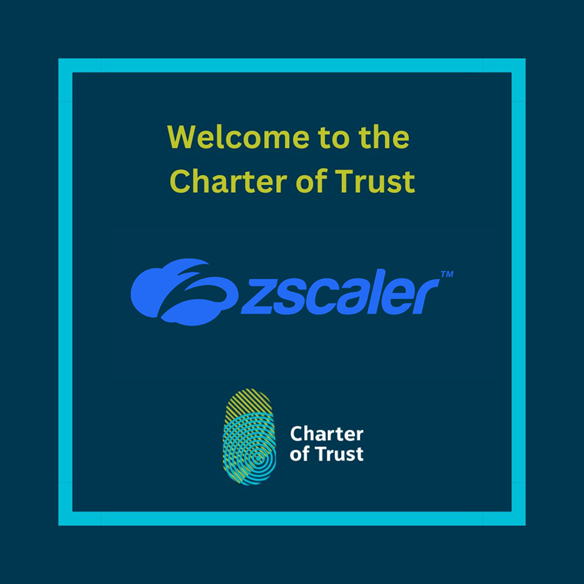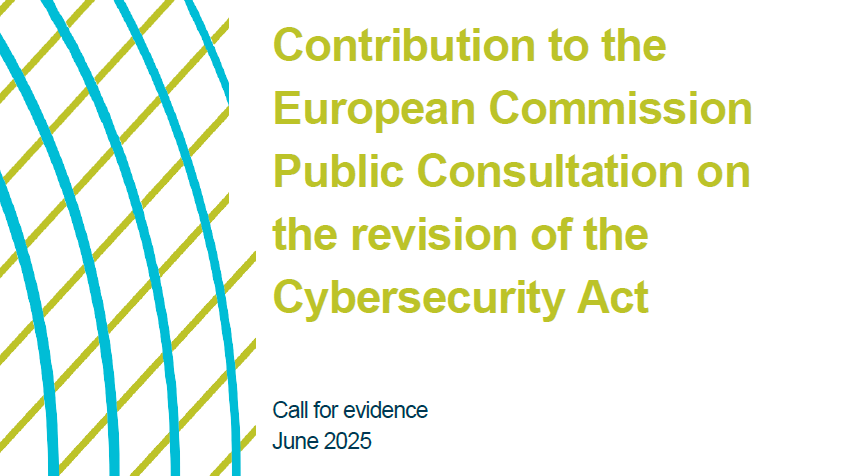• Digital Trust Forum and Charter of Trust to merge
• Bosch and Deutsche Post DHL Group join Charter of Trust
• Associated Partner Forum further growing with CyberNB, Cyber Peace Institute, Cyber Readiness Institute and Global Cyber Alliance
The Charter of Trust (CoT) and the Digital Trust Forum (DTF) are to join forces and merge under the Charter of Trust banner to form a joint initiative for greater cybersecurity and digital trust. With this the Charter of Trust also intends to devote more attention to the topic of trustworthy artificial intelligence (AI) in the future.
The CoT was launched at the Munich Security Conference in February 2018 by Siemens and eight partners from the industrial sector. The DTF was formed in Berlin in May 2019 as an initiative of Bosch. With that Bosch will also join the CoT. The world’s leading logistics company Deutsche Post DHL Group has decided to join the cybersecurity initiative in addition, bringing the number of Charter of Trust members up to 17 four years after it was first signed.
“Overcoming reservations and building up trust will be crucial success factors in digital business – and this is more effective with the two initiatives working together. In addition, Bosch brings to the Charter of Trust its deep expertise in artificial intelligence,” said Dr. Tanja Rückert, Chief Digital Officer at Robert Bosch GmbH and a new member of the Charter of Trust’s Board of Directors.
“Cybersecurity is the key to building people’s confidence in digitalization,” said Cedrik Neike, Member of the Managing Board of Siemens AG and CEO Digital Industries. “And we’re significantly stronger if we work together to make our networked world more resilient. By merging the two initiatives, and by bringing on board our new partners, the Charter of Trust will gain even greater diversity and broaden its perspective to cover different industries and countries.”
“As a company, we inherit a long tradition of secure and fast transport of confidential information. But for us as a company, privacy of letters no longer applies exclusively to the postal service. In the digital environment, we also effectively protect our customers’ information along the entire supply chain. By becoming a new member of the Charter of Trust, we want to embrace exchange on supply chain security, because ultimately security incidents may have severe implications on all parties involved,” said David Thornewill, Group CISO of Deutsche Post DHL Group.
Over the last four years, the Charter of Trust has already launched a wealth of measures to enhance cybersecurity – including “Security by Default”, which takes cybersecurity into account right from the design phase and provides products with preconfigured security measures. In addition, the CoT partners have defined established baseline requirements for their suppliers in order to further enhance cybersecurity along supply chains. The main focus in the next phase will be to implement a cross-industry approach to the evaluation of supply chain security. In this context, the growing Charter of Trust community will provide mainly small and medium-sized enterprises with information, training and other resources.
At the Munich Security Conference in February 2018, Siemens and eight partners from industry signed the world’s first joint charter for greater cybersecurity. In addition to Siemens and the Munich Security Conference, the signatories include AES, Airbus, Allianz, Atos, Bosch, Dell Technologies, Deutsche Post DHL Group, IBM, Infineon Technologies AG, Mitsubishi Heavy Industries, NTT, NXP Semiconductors, SGS, TotalEnergies and TÜV SÜD.
The CoT initiative also collaborates regularly with various global authorities and scientific institutions to drive forward the topic of cybersecurity internationally and achieve harmony across national borders and organizational boundaries. Furthermore, the CoT initiative has created the Associated Partner Forum, which institutions such as Germany’s Federal Office for Information Security (BSI), the Spanish National Cryptologic Center (CCN), TU Graz and the Hasso Plattner Institute for Digital Engineering GmbH (HPI) have joined. The Canadian Centre for Cybersecurity, Cyber Readiness Institute, CyberNB, Cyber Peace Institute, Global Cyber Alliance and Japan’s Ministry of Economy, Trade & Industry (METI) and Ministry of Internal Affairs and Communication (MIC) have also recently signed up as associate partners.
The global economy is beginning to realize that increased networking goes hand in hand with an escalating risk of cybercrime: the Allianz Risk Barometer found that companies around the globe consider cyber risk as their number one threat in 2022.
Siemens, AES, Airbus, Allianz, Atos, Bosch, Dell Technologies, Deutsche Post DHL Group, IBM, Infineon, MHI, MSC, NTT, NXP, SGS, TotalEnergies and TÜV SÜD


You may also like

Charter of Trust Welcomes Zscaler
Zscaler is a leading cloud enterprise security provider helping global businesses accelerate their digital transformation by becoming more agile, efficient, resilient, and secure.
With Zscaler as a partner in the Charter of Trust, we aim to strengthen global cyber resilience through trust – by fostering actionable collaboration between industry leaders, governments, and public-private platforms. Zscaler brings robust expertise and innovation to the table, making it the ideal partner to drive this mission forward.
“Zscaler is excited to drive meaningful change alongside our new partners, laying a foundation of trust essential for successful digital transformation,” said Sam Curry, Zscaler CISO. “In today’s world, the need for reducing inherent trust and default access has never been greater. To truly stay ahead of ever-evolving threats, we must unite as a coalition of practitioners. Cyber attackers aren’t taking breaks, and with advancements like artificial intelligence, quantum cryptography, and emerging technologies on the horizon, collaboration is the key to securing the future.”
“We are proud to welcome Zscaler to the Charter of Trust. Their focus on cybersecurity innovation and commitment to openness reflect our shared ambition to create a safer, more resilient digital future. Together, we’ll strengthen trust, transparency, and security across the global digital landscape.” highlighted Dr. Summit Chada, Charter of Trust Co-Chair and COO Group Security & Business Lines CISO at Atos.
“With Zscaler as a Partner of the Charter of Trust, we believe that we can strengthen the global commitment to secure digital transformation by combining technological innovation with the Charter of Trust’s collaborative approach to cybersecurity leadership.” Ralf Schneider, Charter of Trust Co-Chair and Senior Fellow and Head of Cybersecurity and NextGenIT Think Tank at Allianz SE, welcomes Zscaler to the Charter of Trust.
We are excited to join forces and work together to advance digital trust and security across industries.

Contribution to the EU Commission Public Consultation on the revision of the Cybersecurity Act
We support Policy Option 2, which focuses on targeted regulatory measures that address key challenges without creating unnecessary complexity. In this context, we emphasize the need to enhance the role and resources of ENISA, to ensure effective implementation of both current legislation and the European Cybersecurity Certification Framework (ECCF).
Our recommendations aim to improve transparency, collaboration, and efficiency across the EU’s cybersecurity landscape. These include:
- Introducing clear timelines for the development of certification schemes.
- Enhancing stakeholder engagement throughout the process.
- Establishing more structured communication channels between ENISA, the Stakeholder Cybersecurity Certification Group (SCCG), and sectoral ISACs (Information Sharing and Analysis Centers).
We call for a stronger ECCF, one that is transparent, inclusive, and aligned with international standards to foster global interoperability and ease compliance for organizations across borders. Equally critical is the harmonization of certification practices across EU member states and the mutual recognition of certifications to minimize regulatory fragmentation.
The Charter of Trust advocates for technically robust, standards-based certification schemes, with well-defined roles and responsibilities. We also stress the need for clarity on the interplay between voluntary and mandatory certifications, particularly in relation to the upcoming Cyber Resilience Act (CRA).
To streamline compliance and reduce administrative burden, we propose a unified, risk-based incident reporting regime that consolidates requirements under regulations such as NIS2, CRA, GDPR, and DORA. This would not only simplify reporting for organizations but also enhance the EU’s overall cyber resilience. In addition, we recommend incorporating liability protections and grace periods for incident disclosure.
Finally, we urge the Commission to strengthen supply chain security by adopting a risk-based classification approach and establishing baseline cybersecurity requirements for ICT suppliers.
The Charter of Trust remains fully committed to supporting the European Commission in shaping a secure, resilient, and trusted digital future for Europe. We look forward to continued collaboration in building a cybersecurity framework that meets the needs of all stakeholders, today and in the years to come.




